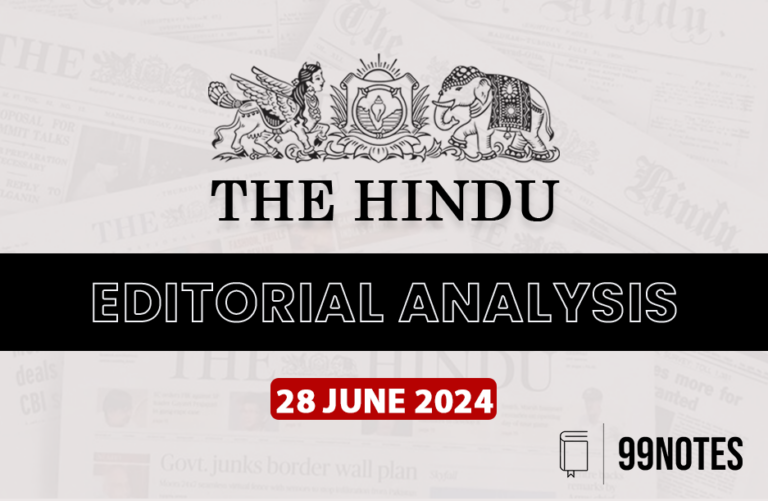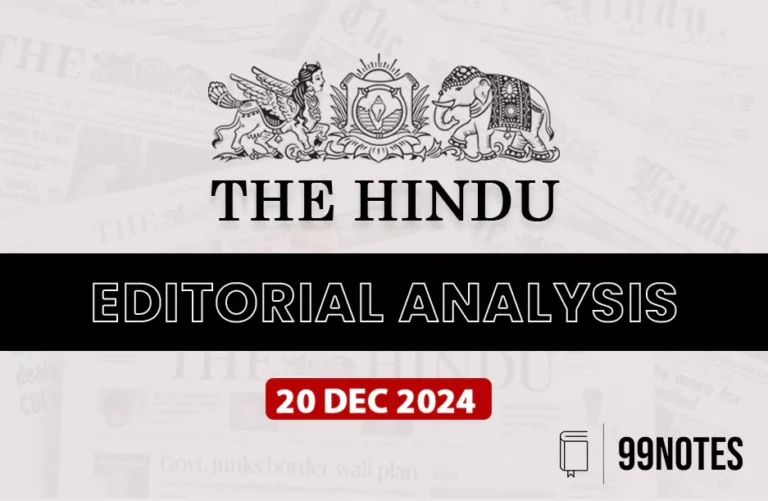23 June 2023 : The Hindu Editorial
The Hindu Editorial
23-June-2023
Daily Current Affairs For UPSC ,The Hindu Editorial Summary
1. Spiralling violence: On the West Bank
Topic: GS2 – International relations
Context:
-
-
-
Recent incidents in the occupied West Bank have led to a sharp escalation in violence in the region.
-
-
What’s the situation at present?
-
-
-
Israeli raids, gun attacks, and settler rampages have resulted in casualties on both the Israeli and Palestinian sides.
-
Local Palestinian resistance groups, such as the Jenin Brigade, have emerged, carrying out attacks using home-made weapons and low-tech bombs.
-
Israel conducts frequent raids in the West Bank, particularly in areas like Jenin, which has become a hotbed of violent resistance.
-
The Israeli cabinet’s approval of new settlements in the West Bank has contributed to the escalation of violence.
-
Palestinians have resorted to isolated knife attacks, known as the ‘knife intifada,‘ but local groups are now carrying out larger attacks.
-
Israel responds by launching attacks on Palestinian villages and demolishing the houses of attackers with impunity.
-
The Palestinian territories are divided, with Fatah controlling the West Bank and Hamas ruling Gaza.
-
The Arab world’s focus has shifted towards improving ties with Israel, and international reactions to the ongoing violence have been limited.
-
Genuine efforts, such as freezing Israeli settlements and initiating dialogue, are needed to break the cycle of violence and find a political solution.
-
-
Brief history about Israel-Palestine conflict:
-
-
-
The conflict between Israelis and Palestinians dates back to the late 19th century with the rise of Zionism, a movement advocating for a Jewish homeland in Palestine.
-
In 1947, the United Nations proposed a partition plan to divide Palestine into separate Jewish and Arab states, but it was rejected by Arab leaders.
-
The establishment of the State of Israel in 1948 led to a war between Israel and neighboring Arab states, resulting in displacement and the creation of Palestinian refugee populations.
-
The 1967 Six-Day War saw Israel capture the West Bank, including East Jerusalem, and the Gaza Strip, among other territories, which are considered occupied by the international community.
-
The Palestinian Liberation Organization (PLO), led by Yasser Arafat, emerged as the main representative of the Palestinian people and pursued armed struggle against Israel.
-
The Oslo Accords, signed in the 1990s, aimed to establish a framework for peace negotiations and the creation of a Palestinian state, but the process stalled and did not lead to a final resolution.
-
The Second Intifada, a period of intensified Palestinian-Israeli violence, erupted in 2000 and lasted several years, resulting in thousands of deaths and widespread destruction.
-
Israel has constructed a barrier, commonly known as the “Israeli West Bank barrier” or “security fence,” which Palestinians view as an obstacle to their freedom of movement, while Israel considers it necessary for security.
-
Efforts to reach a two-state solution, with Israel and Palestine living side by side in peace, have faced challenges, including disputes over borders, settlements, Jerusalem, and the right of return for Palestinian refugees.
-
The Gaza Strip, governed by Hamas since 2007, has faced multiple conflicts and Israeli military operations, including a blockade imposed by Israel and Egypt, severely restricting the movement of goods and people.
-
The international community, including the United Nations, has been involved in various peace initiatives and negotiations to find a lasting solution to the conflict, but a comprehensive resolution remains elusive.
-
-
2. An organised counter to organised hate.
Topic: GS2.
Context:
-
-
-
Communal disturbances in Maharashtra, performative religiosity in the new Parliament’s inauguration, and The Kerala Story – these issues often create divisions between Hindus and Muslims, and challenge constitutional values against traditional values.
-
Despite the significant impact on India’s social fabric, little attention has been given to understanding why regressive tendencies gain social support.
-
It is crucial to analyze and dissect the root causes of hate in order to address the flames engulfing India and other nations experiencing similar challenges.
-
-
The anatomy of organised hate:
-
-
-
There are three types of hatred: organised hate, inherited hate passed down through generations, and absorbed hate that affects the silent majority.
-
Progressive forces counter organised hate through debunking misinformation and challenging regressive actions.
-
Progressives rely on shaping public discourse and assume people will naturally adopt progressive positions, but empirical evidence suggests this strategy is failing.
-
-
Structurally combating hate:
-
-
-
The hatred engulfing India has led to the shrinking of whole communities.
-
Collaboration with civil society is crucial for a complementary response mechanism and the promotion of progressive ideological projects.
-
Engaging with religious leaders/organizations can delegitimize atavistic causes and challenge existing misinformation.
-
It is important to identify and counter the financial infrastructure supporting regressive causes, targeting the benefactors and closing the taps empowering such organizations.
-
Commitment to ideology and principled politics, as demonstrated by Jawaharlal Nehru’s fight against communalism, is needed to counter hate and protect India’s values and ideals.
-
-
Reasons for increasing organised hate:
-
-
-
Political Manipulation: Certain political parties and organisations exploit divisive ideologies and narratives to gain power and maintain control. They use hate as a tool to mobilise their supporters, create a sense of identity, and foster a “us versus them” mentality.
-
Socio-economic Factors: Socio-economic disparities, unequal distribution of resources, and marginalisation of certain groups can fuel resentment and animosity. People who feel left behind or disadvantaged may be more susceptible to ideologies that blame others for their hardships.
-
Identity Politics: Appeals to religious, ethnic, or nationalistic identities can be used to mobilise support and create a sense of belonging. When these identities are manipulated to create a sense of superiority or to marginalise others, it contributes to the growth of organised hate.
-
Echo Chambers and Social Media: The rise of social media platforms has created echo chambers where like-minded individuals reinforce their beliefs, often without exposure to diverse perspectives. This can lead to the radicalisation of individuals and the spread of hate-filled ideologies.
-
Historical Grievances: Lingering historical grievances, unresolved conflicts, and intergroup tensions can provide fertile ground for organised hate. Past events and perceived injustices are sometimes weaponised to stoke anger and resentment towards specific groups.
-
Lack of Education and Critical Thinking: Limited access to quality education and critical thinking skills can make individuals more susceptible to manipulation and propaganda. Inadequate understanding of complex social and political issues can lead to the acceptance of hateful ideologies.
-
Economic and Political Instability: Times of economic hardship and political instability can exacerbate societal tensions and create fertile ground for organized hate groups to thrive. People may seek scapegoats and turn to extremist ideologies for simplistic explanations and solutions.
-
-
Ways to counter organised hate:
-
-
-
Promote Education and Awareness: Counter organised hate by promoting education and raising awareness about the dangers and consequences of hate-driven ideologies. Develop educational programs that emphasiee tolerance, inclusivity, and respect for diversity.
-
Strengthen Legal Frameworks: Enact and enforce laws that explicitly address hate crimes, hate speech, and discrimination. Provide legal avenues for victims of hate crimes to seek justice and hold perpetrators accountable.
-
Build Strong Institutions: Strengthen democratic institutions, including the judiciary, law enforcement agencies, and human rights commissions, to effectively address instances of organised hate. Ensure these institutions are independent, impartial, and equipped to handle hate-related cases.
-
Foster Inter-community Dialogue: Facilitate meaningful and constructive dialogue between communities to bridge divides and promote understanding. Encourage interfaith and intercultural initiatives that foster cooperation, empathy, and mutual respect.
-
Promote Media and Digital Literacy: Enhance media literacy programs to help individuals critically analyze and evaluate information sources. Encourage responsible journalism and media practices that avoid sensationalism, stereotypes, and the spread of hate speech.
-
Support Grassroots Initiatives: Empower local community organisations and initiatives that actively work towards countering hate and promoting social cohesion.
-
Promote Political Engagement: Encourage individuals to actively participate in the political process to counter hate-driven narratives. Support political parties and leaders who uphold values of inclusivity, diversity, and social justice.
-
Strengthen International Cooperation: Collaborate with international organisations, governments, and civil society groups to develop joint initiatives and share best practices in countering organised hate. Foster global cooperation to address the transnational nature of hate movements.
-
-
Source: https://www.thehindu.com/opinion/lead/an-organised-counter-to-organised-hate/article66998454.ece
3. The challenges of reporting on an ethnic conflict.
Topic: GS3 – Media.
Context:
-
-
-
In Manipur, ongoing ethnic violence has resulted in a deep division among journalists, with reporting often aligned along community lines.
-
Journalists face dangers and pressures on the ground, including threats from angry locals and physical assaults.
-
The political establishment has failed to address the situation or protect press freedom.
-
Reporters from outside Manipur are labeled as “parachute journalists” and accused of lacking understanding of the state’s history and culture.
-
-
Challenges of reporting on an ethnic conflict:
-
-
-
Safety and Security: Journalists working in areas of ethnic conflict face significant risks to their personal safety. There may be active hostility and threats from both sides of the conflict, making it dangerous to gather information and report on the ground.
-
Lack of Access: Conflict zones can be difficult to access due to restricted movement, curfews, checkpoints, or hostile environments. Journalists may struggle to reach affected areas and gather accurate information.
-
Bias and Propaganda: Ethnic conflicts are often deeply rooted in historical grievances and political ideologies, leading to strong biases and propaganda from different sides. Journalists must navigate through a multitude of narratives and ensure they maintain objectivity in their reporting.
-
Censorship and Suppression: Governments or authorities involved in the conflict may try to control the flow of information by imposing censorship or restricting media coverage. Journalists may face intimidation, harassment, or even imprisonment for reporting on sensitive issues.
-
Emotional Toll: Covering an ethnic conflict can take a significant emotional toll on journalists. Witnessing violence, suffering, and loss can be traumatic, affecting their mental well-being and ability to report objectively.
-
Cultural and Language Barriers: Ethnic conflicts often involve distinct cultural and linguistic groups. Journalists who are not familiar with the local culture, language, or historical context may face challenges in understanding and accurately reporting on the complexities of the conflict.
-
-
4. A doorway to an entrepreneurial university.
Topic: GS3 – Indian society.
Context:
-
-
-
The modern university system has facilitated the growth of new disciplines and sub-disciplines.
-
In this context, The concept of the entrepreneurial university is emerging, aiming to balance education and enterprise.
-
-
What is entrepreneurial university?
-
-
-
The concept of the entrepreneurial university is emerging, aiming to balance education and enterprise.
-
The University Grants Commission (UGC) in India has introduced the concept of “Professor of Practice” (PoP) to bring industry expertise into academia.
-
PoPs are practitioners from outside academia who share their practical knowledge and skills with students.
-
PoPs can contribute to applied learning, mentorship, research collaboration, and commercialization of patents.
-
PoPs serve as ambassadors for universities, building industry relationships and providing internship and job opportunities.
-
Innovation is the third pillar of universities, alongside teaching and research.
-
An entrepreneurial university combines research, industry work, and academia to generate new ideas, patents, and commercial products.
-
PoPs may eventually lead to a generation of “entrepreneurs in residence” who inspire students to create innovative ventures.
-
-
For Enquiry

23 June 2023 : The Hindu Editorial

23 June 2023 : Daily Current Affairs

22 June 2023 : Daily Quiz

21 June 2023 : Daily Quiz

22 June 2023 : Indian Express

22 June 2023 : PIB

22 June 2023 : The Hindu Editorial

22 June 2023 : Daily Current Affairs

21 June 2023 : Indian Express

21 June 2023 : PIB
The Hindu 23 June 2023 : The Hindu Editorial The Hindu Editorial
22-June-2023
Daily Current Affairs For UPSC ,The Hindu Editorial Summary
Facebook-f
Twitter
Youtube
1….
Daily Current Affairs 23 June 2023 : Daily Current Affairs DAILY CURRENT AFFAIRS
23-June-2023
Daily Current Affairs For UPSC ,Daily Current affairs of The hIndu…
Daily Quiz 22 June 2023 : Daily Quiz 22 June 2023 : Daily Quiz…
Daily Quiz 21 June 2023 : Daily Quiz 21 June 2023 : Daily Quiz…
Indian Express 22 June 2023 : Indian Express Indian Express
22-June-2023
The Indian Express, CSE candidates can stay informed about current events…
PIB 22 June 2023 : PIB PRESS INFORMATION BUREAU
22-June-2023
Daily Current Affairs For UPSC ,The PIB ( Press Information Bureau…
The Hindu 22 June 2023 : The Hindu Editorial The Hindu Editorial
22-June-2023
Daily Current Affairs For UPSC ,The Hindu Editorial Summary
Facebook-f
Twitter
Youtube…
Daily Current Affairs 22 June 2023 : Daily Current Affairs DAILY CURRENT AFFAIRS
22-June-2023
Daily Current Affairs For UPSC ,Daily Current affairs of The hIndu…
Indian Express 21 June 2023 : Indian Express Indian Express
21-June-2023
The Indian Express, CSE candidates can stay informed about current events…
PIB 21 June 2023 : PIB PRESS INFORMATION BUREAU
21-June-2023
Daily Current Affairs For UPSC ,The PIB ( Press Information Bureau…



